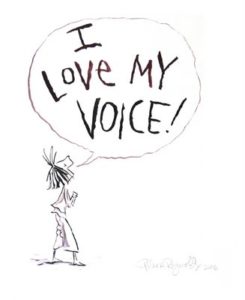What We Talk About When We Talk About 'Voice'
If you’re a writer or someone who loves literature, you probably read the title to this blog and understood immediately that I’m referencing Raymond Carver’s short story, “What We Talk About When We Talk About Love.”
How wonderful for a writer to be known simply by the syntax of a title, a single sentence, or a certain tone.
And that’s what we mean, when we talk about a writer’s voice. It’s that instantly recognizable unique something, which might be copied or parodied, but can never be stolen.
Raymond Carver is known for his spare, minimalist style, but also for a certain world-weary, fatalistic yet deeply compassionate world-view. In fact, there are some who contend Carver’s style wasn’t really his, but the style of his editor, Gordon Lish, and when the truth of how severely Lish cut Carver’s prose prior to publication came to light, many were shocked and disillusioned. But, while Carver’s prose was certainly more expansive, and perhaps more nuanced in the work he published without first subjecting it to Lish’s scalpel, in either case, who the man was, how he viewed the world and how he sounded when he told stories about it remained the same — more deeply shaded possibly, but still recognizable as Carver.
A writer’s voice is not merely the style, the syntax, the shape of the prose, although that’s certainly part of it; it is also how the writer sees the world, his or her experience of the world, artistically revealed. This changes as the writer changes, and so the full range and tone of someone’s voice really can’t be ascertained until the entire body of work is examined, which one can’t do while the writer is still writing. But nonetheless, we have a sense of the territory, the perspective a writer is going to examine, and what their approach to it may be if we are familiar with their work.
In other words, we know a Philip Roth book, for example, when we read it, and would do so even without his name being on the cover. The same with Alice Munro or David Adams Richards or Martin Amis or Toni Morrison.
Some people will say the strength of a writer’s voice — its individuality and authenticity — is what makes the difference between a great writer and a merely competent one.
And how, we might ask ourselves as emerging writers, does one discover one’s voice?
Well, here’s the paradox: you have to stop trying so damn hard. Like most things in life, it’s about acceptance, in this case, accepting yourself the way you are, not the way you think you ought to be in order to qualify as a Real Writer. Just tell me a story! In your own words. Don’t try to be ‘literary’ or sound like your favorite writer or sound the way you think a writer (a Real Writer) ought to sound. Just tell me a story.
Remember when you were younger than you are now and you were forever asking, Who am I? (Maybe you’re still asking!) You tried on different kinds of clothes, make-up, music. One week Goth, the next neo-Bohemian, maybe a little Audrey Hepburn beat poet, hipster, hip hop, Edwardian dandy. You would decorate your room in movie posters one week, Indian shawls and incense the next, Japanese austerity the week after that. All of these experiments, to see which one fit best, but none of them really did, because they were imposed from the outside.
Then, at some point, you stop trying so damn hard. You wear clothes that fit you and are pleasing to you. You decorate your space in ways that feel comfortable and right. You read books you like, not because they’re on this week’s bestseller list. You discover you like Bach more than Beck and don’t care you can’t name a Justin Beiber tune to save your life.
You’re coming in to your own style.
It’s the same with writing. At first we write in imitation of the writers we admire, and that’s as it should be. It’s a stepping stone to finding out what rings true, and what rings false, for us. But don’t get trapped there. By all means, learn from the writers you admire, but don’t try and be them. (And to all those young men who think they’re the next Charles Bukowski — you’re not, and besides, the world doesn’t need another Bukowski. But it just might need YOU.) Let go. . . let yourself out onto the page and you will surprise yourself.
If it’s true writers write to create meaning, to find our what we think about things and to bring order to chaos (all of which I believe, not to mention to entertain, of course), they the process of writing from this ‘you’ place, will naturally get you thinking about what you believe or don’t, things that obsess you, bother you, puzzle you, enliven you, etc. . . and while you’re writing about these things you will clarify what you think about them, and that — how you experience and perceive the world — is an enormous component of voice.
But none of this can be forced, it can only be encouraged, nurtured and revealed. And that’s part of the great joy of being a writer. Heck, it’s part of the great joys of being human!


I know this is an older entry but I have been going through your Writing Process entries for inspiration and I found it in one line, “Let go. . . let yourself out onto the page and you will surprise yourself.” Thank you for writing it!
Ms. Aisha… thanks for taking the time to comment. I’m so glad you found something useful here. If you happen to be in the New Jersey area, I give writing workshops, if you’re interested. You’ve reminded me I should post a few more things about the writing process! Hope your writing is going well.